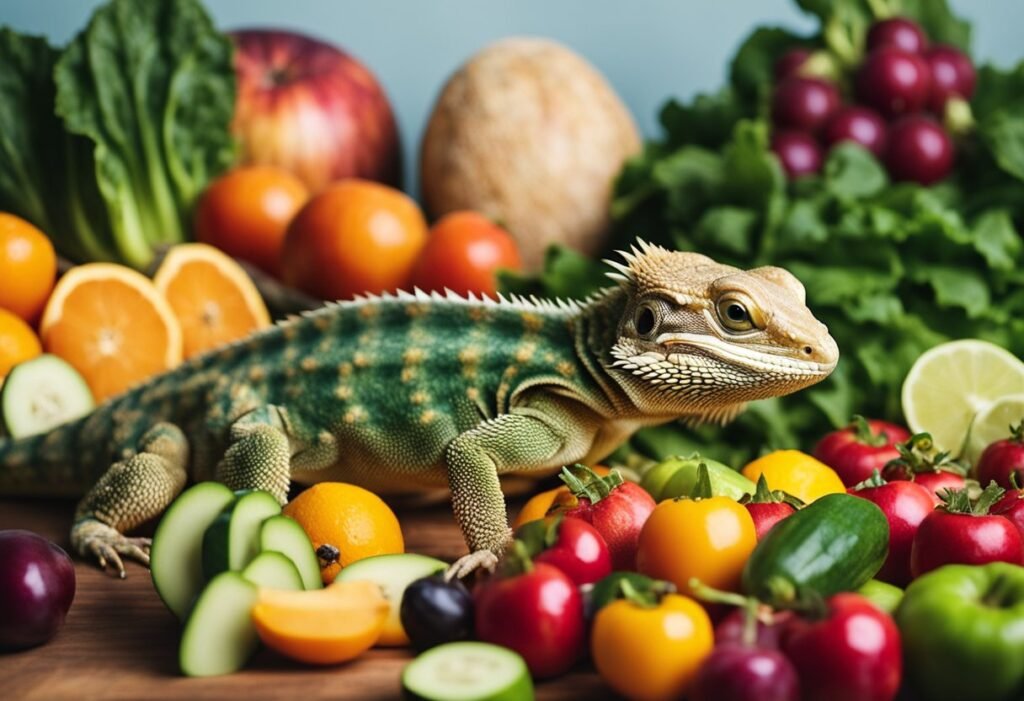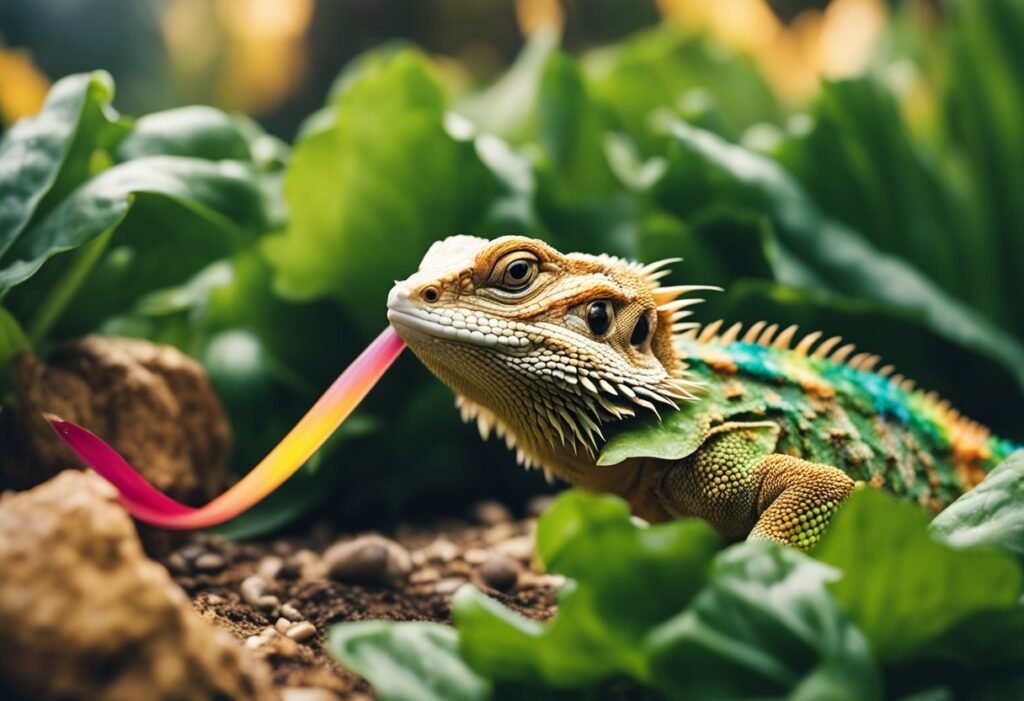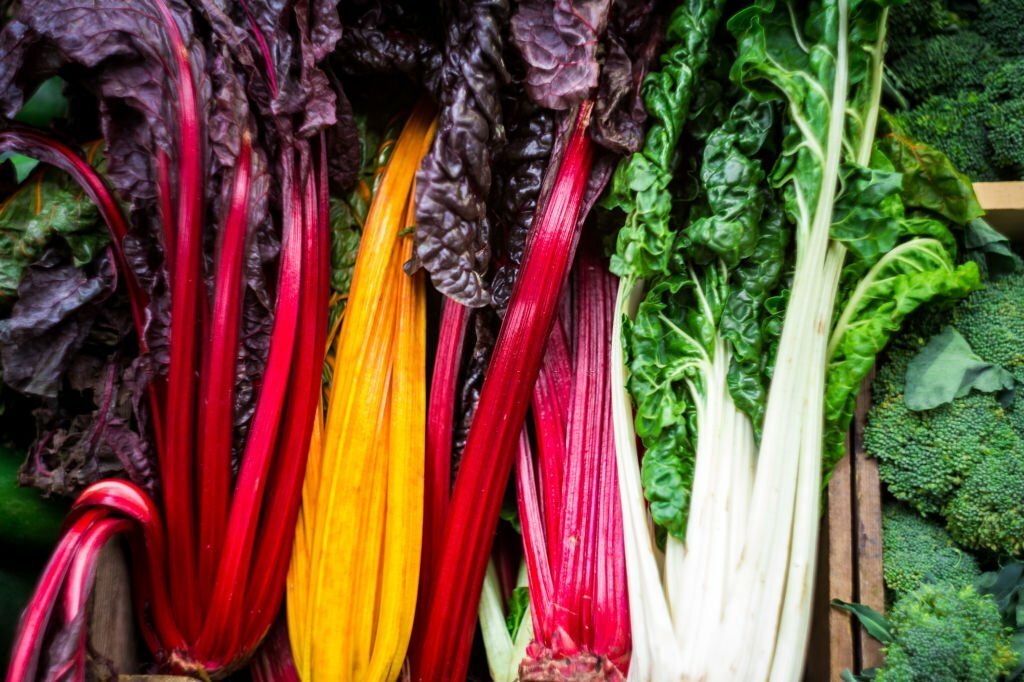Bearded dragons are known for their voracious appetite and their ability to eat a wide variety of foods. However, not all foods are safe or healthy for them to consume. One food that many bearded dragon owners wonder about is rainbow chard. Can bearded dragons eat rainbow chard?
Rainbow chard is a leafy green vegetable that is high in nutrients such as vitamin A, vitamin C, and calcium. It also contains oxalates, which can bind to calcium and prevent its absorption. While rainbow chard can be a healthy addition to a human diet, it is important to consider whether it is safe for bearded dragons to eat. In this article, we will explore the nutritional value of rainbow chard and whether it is a suitable food for bearded dragons.
Understanding Bearded Dragons’ Diet

As responsible pet owners, it is important to understand what we can and cannot feed our bearded dragons. Bearded dragons are omnivores and require a balanced diet of both plant and animal matter. In the wild, they consume a variety of insects, vegetables, and fruits.
When it comes to feeding our bearded dragons, it is important to provide them with a variety of foods to ensure they are getting all the necessary nutrients. Rainbow chard is a type of leafy green vegetable that can be included in their diet.
Rainbow chard is rich in vitamins A, C, and K, as well as calcium, iron, and fiber. However, it should not be the main staple of their diet and should be fed in moderation.
It is important to note that bearded dragons have specific dietary requirements and cannot eat all types of fruits and vegetables. Some vegetables, such as spinach and kale, contain high levels of oxalates which can bind to calcium and prevent its absorption, leading to health problems such as metabolic bone disease.
In summary, while rainbow chard can be a healthy addition to a bearded dragon’s diet, it should not be the only vegetable offered and should be fed in moderation. It is important to research and understand the specific dietary needs of bearded dragons to ensure they remain healthy and happy.
The Nutritional Value of Rainbow Chard

Rainbow chard is a leafy green vegetable that is a member of the beet family. It is a nutritious vegetable that can provide a variety of vitamins and minerals to the diet of bearded dragons. Here are some of the key nutrients found in rainbow chard:
- Vitamin A: Rainbow chard is an excellent source of vitamin A, which is important for maintaining healthy eyesight and skin.
- Vitamin K: Rainbow chard is also a good source of vitamin K, which plays a role in blood clotting and bone health.
- Vitamin C: Rainbow chard contains vitamin C, an antioxidant that helps protect cells from damage.
- Calcium: Bearded dragons need calcium for strong bones and teeth, and rainbow chard is a good source of this mineral.
- Iron: Rainbow chard is a source of iron, which is important for the production of red blood cells.
In addition to these nutrients, rainbow chard is also low in calories and high in fiber, making it a good choice for bearded dragons who need to maintain a healthy weight.
Overall, rainbow chard can be a nutritious addition to the diet of bearded dragons. However, it should be fed in moderation, as too much can lead to digestive issues. It is also important to ensure that the chard is thoroughly washed and free of any pesticides or other harmful chemicals before feeding it to your pet.
Can Bearded Dragons Eat Rainbow Chard?

As responsible bearded dragon owners, we always want to make sure that we are feeding our pets a healthy and balanced diet. While it is important to provide them with a variety of fruits and vegetables, it is equally important to know which ones are safe for them to eat.
Rainbow chard is a leafy green vegetable that is packed with nutrients such as vitamins A, C, and K, as well as fiber and calcium. But can bearded dragons eat rainbow chard?
The answer is yes, bearded dragons can eat rainbow chard in moderation. However, it should not be a staple food in their diet as it contains high amounts of oxalates, which can bind to calcium and prevent its absorption. This can lead to metabolic bone disease, a serious health condition in bearded dragons.
It is important to note that rainbow chard should always be fed in moderation and as part of a balanced diet. We recommend feeding it to your bearded dragon no more than once or twice a week, and always in small quantities.
In conclusion, while rainbow chard is a nutritious vegetable, it should be fed in moderation to your bearded dragon due to its high oxalate content. As with any new food, it is important to introduce it slowly and monitor your pet’s reaction to it.
How to Prepare Rainbow Chard for Bearded Dragons

We all want our bearded dragons to be healthy and happy, and a big part of that is making sure they have a well-balanced diet. Rainbow chard is a nutritious and colorful leafy green that can be a great addition to your bearded dragon’s diet. Here’s how to prepare it for them:
Washing
First, it’s important to wash the rainbow chard thoroughly to remove any dirt or pesticides. We recommend rinsing it under cool running water and gently rubbing the leaves with your hands to remove any debris.
Chopping
Next, you’ll want to chop the rainbow chard into small pieces that are easy for your bearded dragon to eat. We suggest using a sharp knife or kitchen scissors to cut it into bite-sized pieces.
Serving
Rainbow chard can be served raw or cooked. If you choose to serve it raw, make sure to remove any tough stems and only serve the leaves. If you prefer to cook it, you can steam or sauté it until it’s tender.
Frequency
While rainbow chard is a healthy addition to your bearded dragon’s diet, it should be fed in moderation. We recommend offering it as part of a varied diet, along with other leafy greens, vegetables, and insects.
By following these simple steps, you can prepare rainbow chard for your bearded dragon in a way that is safe and nutritious.
Feeding Frequency and Portion Sizes
When it comes to feeding your bearded dragon rainbow chard, it is important to keep in mind the proper feeding frequency and portion sizes. Overfeeding can lead to obesity and other health issues, while underfeeding can result in malnutrition.
We recommend feeding adult bearded dragons rainbow chard once or twice a week, in addition to a varied diet of other vegetables and insects. Juvenile bearded dragons may require more frequent feedings, up to three times a week.
As for portion sizes, a good rule of thumb is to offer a portion that is roughly the size of the bearded dragon’s head. This ensures that they are getting enough nutrients without overdoing it. It is also important to remember to remove any uneaten food after a few hours to prevent spoilage and bacterial growth.
In addition to rainbow chard, it is important to offer a variety of other vegetables such as kale, collard greens, and squash to ensure a well-rounded diet. It is also important to offer a variety of insects, such as crickets and mealworms, as a source of protein.
Overall, feeding your bearded dragon rainbow chard can be a healthy addition to their diet when done in moderation and in combination with other nutritious foods.
Potential Risks and Precautions
When feeding your bearded dragon rainbow chard, there are a few potential risks and precautions to keep in mind.
Firstly, rainbow chard contains high levels of oxalic acid, which can bind to calcium and prevent its absorption. This can lead to calcium deficiency and metabolic bone disease in bearded dragons. Therefore, it is important to feed rainbow chard in moderation and alongside calcium-rich foods such as calcium powder or calcium-rich vegetables like kale or collard greens.
Secondly, rainbow chard may contain pesticides or other harmful chemicals if not grown organically. Therefore, it is important to wash the chard thoroughly before feeding it to your bearded dragon or to purchase organic rainbow chard to ensure it is free of harmful chemicals.
Lastly, bearded dragons may have individual sensitivities or allergies to certain foods, including rainbow chard. Therefore, it is important to introduce new foods slowly and monitor your bearded dragon for any signs of digestive upset or allergic reactions.
Overall, rainbow chard can be a healthy and nutritious addition to your bearded dragon’s diet when fed in moderation and with appropriate precautions.
Alternatives to Rainbow Chard in Bearded Dragons’ Diet

As we know, bearded dragons require a balanced diet that consists of various fruits and vegetables. While rainbow chard is a nutritious leafy green, it may not be readily available or affordable in some areas. Therefore, we have compiled a list of alternative greens that can be fed to bearded dragons.
- Collard Greens – Collard greens are an excellent source of calcium, vitamin A, and vitamin C. They are also low in oxalates, which can be harmful to bearded dragons when consumed in large amounts.
- Mustard Greens – Mustard greens are also a great source of calcium, vitamin A, and vitamin C. They are higher in oxalates than collard greens, so it’s important to feed them in moderation.
- Dandelion Greens – Dandelion greens are a safe and nutritious option for bearded dragons. They are high in calcium, vitamin A, and vitamin C. However, it’s important to ensure that the dandelions have not been sprayed with any pesticides.
- Turnip Greens – Turnip greens are a good source of calcium, vitamin A, and vitamin C. They are also low in oxalates, making them a safe option for bearded dragons.
- Endive – Endive is a leafy green that is high in vitamin A and low in oxalates. It’s a great alternative to rainbow chard and can be fed to bearded dragons in moderation.
Overall, there are many safe and nutritious alternatives to rainbow chard that can be included in a bearded dragon’s diet. It’s important to offer a variety of greens to ensure that they are receiving all the necessary nutrients.
Frequently Asked Questions
What vegetables can bearded dragons eat besides chard?
Bearded dragons can eat a variety of vegetables including collard greens, mustard greens, dandelion greens, turnip greens, and kale. These vegetables are high in calcium and other essential nutrients that bearded dragons need to stay healthy.
Can bearded dragons safely consume rainbow kale?
Yes, bearded dragons can safely consume rainbow kale. However, it should be fed in moderation as it contains high levels of oxalates, which can bind to calcium and prevent its absorption.
Are there any greens that bearded dragons should avoid?
Yes, there are some greens that bearded dragons should avoid. These include spinach, beet greens, and Swiss chard as they contain high levels of oxalates, which can lead to the formation of kidney stones.
What are the best greens for bearded dragons?
The best greens for bearded dragons are those that are high in calcium and low in oxalates. Some good options include collard greens, mustard greens, dandelion greens, turnip greens, and kale.
Can bearded dragons eat cabbage?
Yes, bearded dragons can eat cabbage, but it should only be fed in small amounts as it contains goitrogens, which can interfere with thyroid function if consumed in large quantities.
What fruits are safe for bearded dragons to eat?
Bearded dragons can eat a variety of fruits including apples, blueberries, raspberries, and strawberries. However, fruits should only be fed in moderation as they are high in sugar and can lead to obesity if consumed in excess.

I, Mark Antonelli am highly interested in pet care tips. The experiences I gained through university life in animal sciences were also helpful to identify the best tricks for caring for and feeding varying kinds of pets. I know the majority of people love to own a pet. Yet, there is a guilty of owing a Bearded Dragon due to a lack of information about how much friendly and peaceful they are. I thought of filling this gap with detailed writings about this Pogona genus Bearded Dragon. All my team is also giving me great support to fulfil my mission. Hope you will enjoy the journey with us.

